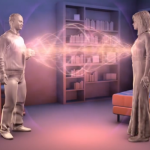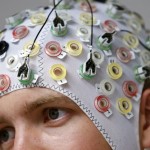Should you believe in a God? Not according to most academic philosophers. A comprehensive survey revealed that only about 14 percent of English speaking professional philosophers are theists. As for what little religious belief remains among their colleagues, most professional philosophers regard it as a strange aberration among otherwise intelligent people. Among scientists the situation is much the same. Surveys of the members of the National Academy of Sciences, composed of the most prestigious scientists in the world, show that religious belief among them is practically nonexistent, about 7 percent.
Genes and environment explain human beliefs and behaviors—people do things because they are genomes in environments. The near universal appeal of religious belief suggests a biological component to religious beliefs and practices, and science increasingly confirms this view. There is a scientific consensus that our brains have been subject to natural selection. So what survival and reproductive roles might religious beliefs and practices have played in our evolutionary history? What mechanisms caused the mind to evolve toward religious beliefs and practices?
Today there are two basic explanations offered. One says that religion evolved by natural selection—religion is an adaptation that provides an evolutionary advantage. For example religion may have evolved to enhance social cohesion and cooperation—it may have helped groups survive. The other explanation claims that religious beliefs and practices arose as byproducts of other adaptive traits. For example, intelligence is an adaptation that aids survival. Yet it also forms causal narratives for natural occurrences and postulates the existence of other minds. Thus the idea of hidden Gods explaining natural events was born.
In addition to the biological basis for religious belief, there are environmental explanations. It is self-evident from the fact that religions are predominant in certain geographical areas but not others, that birthplace strongly influences religious belief. This suggests that people’s religious beliefs are, in large part, accidents of birth. Besides cultural influences there is the family; the best predictor of people’s religious beliefs in individuals is the religiosity of their parents. There are also social factors effecting religious belief. For example, a significant body of scientific evidence suggests that popular religion results from social dysfunction. Religion may be a coping mechanism for the stress caused by the lack of a good social safety net—hence the vast disparity between religious belief in Western Europe and the United States.
There is also a strong correlation between religious belief and various measures of social dysfunction including homicides, the proportion of people incarcerated, infant mortality, sexually transmitted diseases, teenage births, abortions, corruption, income inequality and more. While no causal relationship has been established, a United Nations list of the 20 best countries to live in shows the least religious nations generally at the top. Only in the United States, which was ranked as the 13th best country to live in, is religious belief strong relative to other countries. Moreover, virtually all the countries with comparatively little religious belief ranked high on the list of best countries, while the majority of countries with strong religious belief ranked low. While correlation does not equal causation, the evidence should give pause to religion’s defenders. There are good reasons to doubt that religious belief makes people’s lives go better, and good reasons to believe that they make their lives go worse.
Despite all this most people still accept some religious claims. But this fact doesn’t give us much reason to accept religious claims. People believe many weird things that are completely irrational—astrology, fortunetelling, alien abductions, telekinesis and mind reading—and reject claims supported by an overwhelming body of evidence—biological evolution for example. More than three times as many Americans believe in the virgin birth of Jesus than in biological evolution, although few theologians take the former seriously, while no serious biologist rejects the latter!
Consider too that scientists don’t take surveys of the public to determine whether relativity or evolutionary theory are true; their truth is assured by the evidence as well as by resulting technologies—global positioning and flu vaccines work. With the wonders of science every day attesting to its truth, why do many prefer superstition and pseudo science? The simplest answer is that people believe what they want to, what they find comforting, not what the evidence supports: In general, people don’t want to know; they want to believe. This best summarizes why people tend to believe.
Why, then, do some highly educated people believe religious claims? First, smart persons are good at defending ideas that they originally believed for non-smart reasons. They want to believe something, say for emotional reasons, and they then become adept at defending those beliefs. No rational person would say there is more evidence for creation science than biological evolution, but the former satisfies some psychological need for many that the latter does not. How else to explain the hubris of the philosopher or theologian who knows little of biology or physics yet denies the findings of those sciences? It is arrogant of those with no scientific credentials and no experience in the field or laboratory, to reject the hard-earned knowledge of the science. Still they do it. (I knew a professional philosopher who doubted both evolution and climate science but believed he could prove that the Christian God must take a Trinitarian form! Surely something emotional had short-circuited his rational faculties.)
Second, the proclamations of educated believers are not always to be taken at face value. Many don’t believe religious claims but think them useful. They fear that in their absence others will lose a basis for hope, morality or meaning. These educated believers may believe that ordinary folks can’t handle the truth. They may feel it heartless to tell parents of a dying child that their little one doesn’t go to a better place. They may want to give bread to the masses, like Dostoevsky’s Grand Inquisitor.









